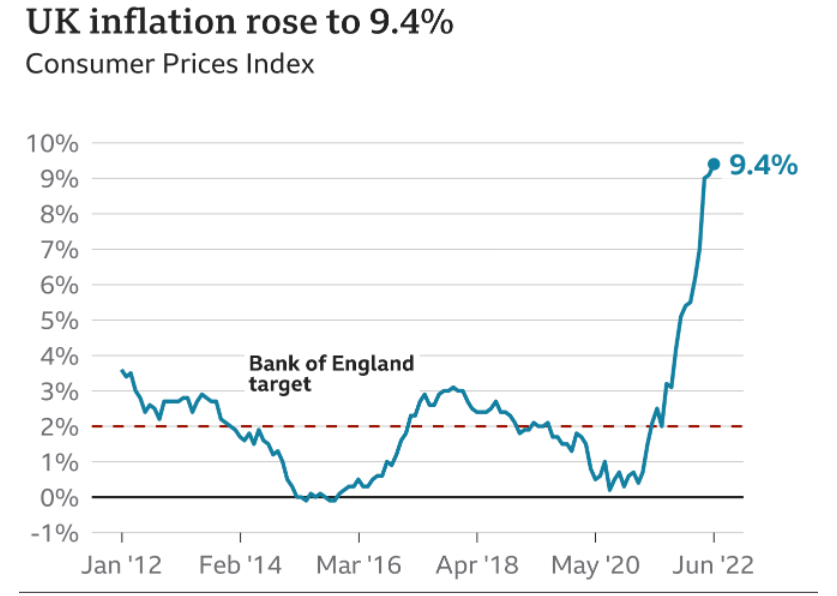Inflation: Fuel, milk and eggs push prices up at fastest rate in 40 years
UK inflation, the rate at which prices rise, jumped to 9.4% in the 12 months to June from 9.1% in May, the Office for National Statistics (ONS) said.
Petrol prices rose by 18.1p per litre in June, while costs for milk, cheese and eggs also climbed, the ONS said.
Unions have been calling for pay rises to help workers cope as the rising cost of living eats into household budgets.
Inflation is the pace at which prices are rising. For example, if a bottle of milk costs £1 and that rises by 5p compared with a year earlier, then milk inflation is 5%.

Fuel prices have soared in recent months, driven by the war in Ukraine and moves by the European Union to reduce its dependence on Russian oil.
Average petrol prices stood at 184p per litre in June, the ONS said, the highest since records began in 1990 and up from 129.7p a year earlier. The monthly rise was also the largest on record.
The average price of diesel in June was 192.4p per litre, again a record high, the ONS said.
It led to the said average family car costing more than £100 to fill up, according to the RAC. However, the AA said this week that lower wholesale costs of fuel were leading to cheaper prices at the pumps, though they still remain much higher than last year.
Elsewhere, food prices have been climbing, with costs increasing at the fastest rate since March 2009.
Milk, cheese and eggs saw the biggest rises in June, latest figures show, with the prices of vegetables, meat and ready meals also up.
Other countries around the world are also experiencing a cost of living squeeze, with many affected by the same global factors as the UK.
However, the UK's inflation rate is currently higher than then US and others in Europe, with the latest estimates of annual inflation for Germany at 8.2% and for France at 6.5%.
Paul Dales, chief UK economist at consultancy Capital Economics, said the two main causes of inflation globally were surging energy prices and worker shortages.
But he said: "The euro-zone has the first factor but not really the second. The US has the second factor, but not really the first. The UK has both. That's why inflation is highest in the UK."
EU governments had also "done more to prevent" higher wholesale gas and electricity prices being passed onto households, he added.
And while the UK's labour market was "just as tight as in the US", it appeared UK workers were "more able to bargain for higher wages", which could fuel further inflation.













